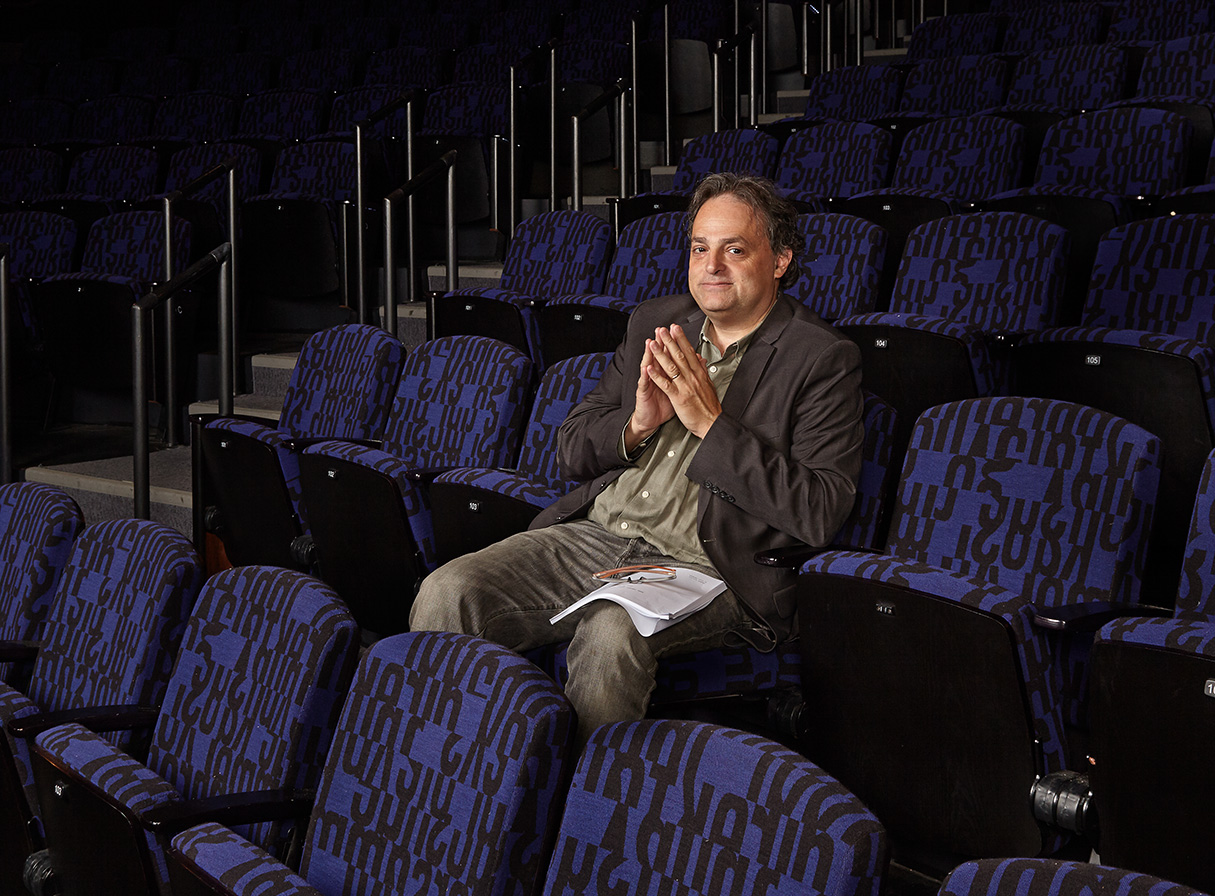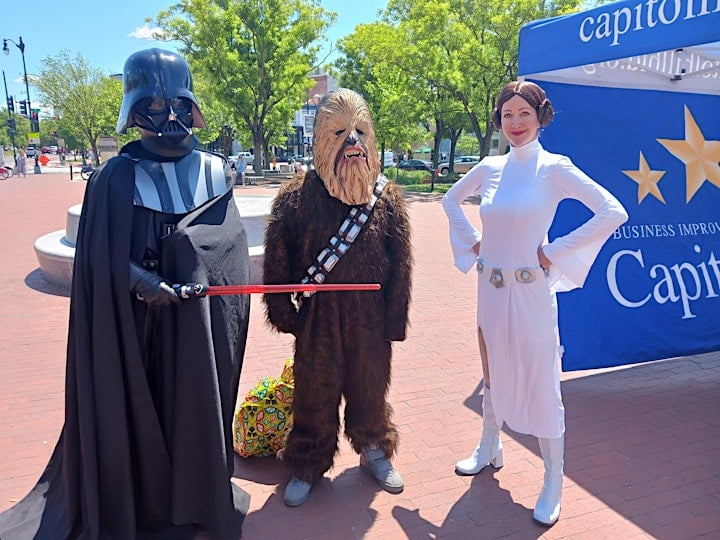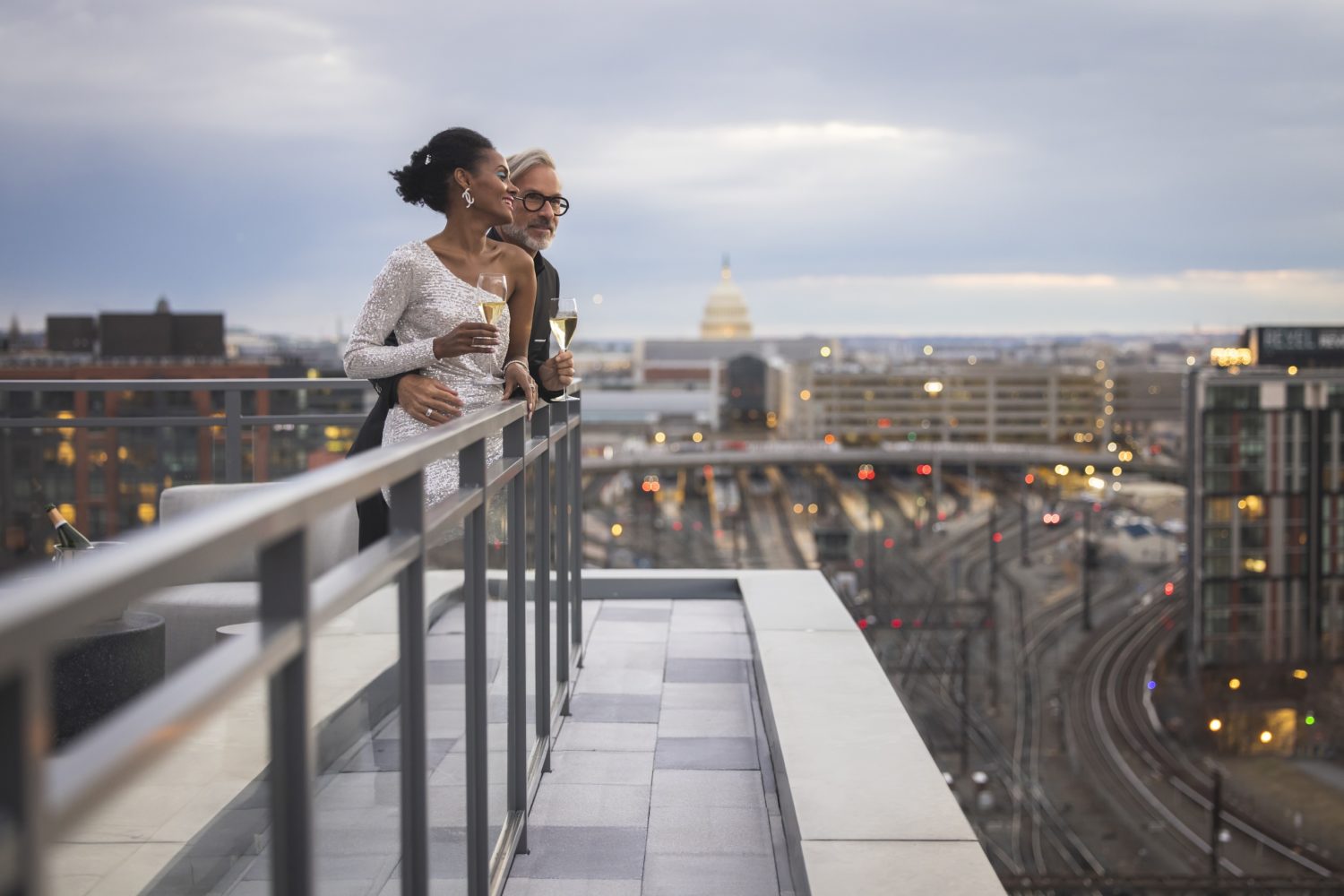Ari Roth may have more to say, in private, about the unpleasantness that accompanied his firing late last year from Theater J, the company based at the Washington DC Jewish Community Center on 16th Street where Roth, 54, spent nearly two decades as artistic director. Under Roth, the group was known for drama that was politically charged, intellectually curious, and above all controversial—too controversial, in the end, for the JCC: Roth’s insistence on presenting plays critical of Israel provoked years-long, increasingly nasty, and ultimately terminal quarreling.
His loudest retort has been a nearly instantaneous rebound. In December, he founded a new company, Mosaic, housed at the Atlas Performing Arts Center on Northeast DC’s H Street. Its board of directors includes five members he shares with Theater J, and the producing director is longtime Studio Theatre stalwart Serge Seiden.
Roth sat down for a conversation about what his rebirth says about the state of theater in Washington.
You’ve landed pretty abruptly in this new part of town with a new company. How’s the transition going?
There are a number of refugees like me on this block. Washington Jewish Week just did a story about me and Jason Feldman, whose bar, Star & Shamrock, is down the street, and Jeremiah Cohen of [H Street’s] Bullfrog Bagels. Three Jewish boys of a certain age who can’t really be called boys anymore. To reboot your career at middle age, right in front of your friends and neighbors—that’s usually the prerogative of a larger city. In DC, there’s usually a quieter exile, but you know, this town has proved itself big enough.
In the last news reports, it was implied you had already planned to leave Theater J. Was that correct?
I was trying to work out a solution. I was looking to continue the kind of programming that we had there. The idea was to move [the controversial plays] to the Atlas but of course maintain ties. Could I have stayed 50 percent at the JCC? Seventy-five percent? It was a negotiation.
But did the decision to leave precede the politics, or was it prompted by them?
It was prompted by them.
So here you are. Mosaic’s debut season opens in October. What have you been doing since you left?
All I’ve been doing is fundraising. We’ve raised three-quarters of a million dollars in five months. That kind of nest egg—which I’ll never have again—is unheard of for a start-up. A two-time president of Woolly Mammoth told me our budget was year 18 for them. I didn’t want to go backwards. I wanted to run a theater that would have a national impact, and this budget allows us to have impact.
A couple of years ago, Washington Post critic Peter Marks wrote about DC’s vibrant theater scene, but he complained that theaters aren’t promoting local talent and that small companies’ successful shows don’t get picked up by bigger houses. Do you think that still applies?
The strength of DC’s theater scene is that there exists a literate, sophisticated audience for political theater. I’m banking on that appetite. Under-remarked in my recent controversy is the fact that a year ago Arena Stage was running Lawrence Wright’s Camp David to sold-out houses, Theater J was doing Golda’s Balcony with Tovah Feldshuh to sold-out houses, while Motti Lerner’s The Admission [a drama about the first intifada, which caused protests from Jewish groups] was also selling out at Theater J before going on to Studio. These were relevant dramas, well produced, well acted, well attended, and all of them making money. How many cities can boast that?
Do you think Washington is underrated as a theater city?
It depends who’s doing the rating.
Well, when you look at lists of regional theater capitals, you see Minneapolis, Chicago—rarely Washington.
For me, it’s not the most relevant of questions. Around the time of my dismissal, 120 artistic directors from around the country who knew the work at Theater J signed a letter [protesting my departure]. It tells you that people are paying attention, which is more important than whether a play is getting picked up. The fact that our shows don’t make it to New York is more a reflection of how frightened New York is, how provincial it is.
Do you worry that your audience won’t come out here?
The longer I’m on H Street, the more I get away from the clucking of “There’s no parking!” and “Are people going to come out there?” There’s curiosity, and people are coming.
You’ve said elsewhere that a theater needs to connect with its neighborhood.
I want Mosaic to be nationally renowned, but that comes from the base we have here. Marcus Gardley’s play The Gospel of Lovingkindness talks about one of the alarm-bell issues of our time, the crisis that befalls young black men in our cities. As important as the Middle East drama is, the urban drama that we see personified up and down H Street—that’s important to us, too. We’re only going to achieve success if we demonstrate an ability to appeal to a real variety of people who come up and down the street.
But those people are probably younger, maybe less politically oriented, and certainly not as interested in Jewish issues as the people who’ve followed you in the past.
The market here will require us to go in a lot of different directions. We have to be funny, surprising, hip, substantive. We’re going to have to do a rock ’n’ roll musical; we’re going to have to do that edgy play looking at questions of sexuality and celebrating them. But we can only do so many things in a year. This first season will be an identity marker, but each year is going to add to the footprint of who we are.
So who do you expect to see walking into the theater come October?
Mostly I expect to see a lot of Capitol Hill people who are comfortable walking, who don’t have a lot of anxiety about coming out here, a reasonable amount of Theater J audience, and people familiar with Serge Seiden’s work. I expect it to have a healthy component of Jews. I’ll be disappointed when all is said and done if it’s an all-white audience. We’re going to make real efforts to diversify the audience.
How are you going to do that?
You develop a community. You create relationships with cultural centers, schools, businesses, the press. There are four or five hip-hop societies and slam-poetry venues we have deep relationships with, so we’ll bring them in for post-performance events. You get into the programmatic flow. Then when you’re not performing, you bring your issues to others. You get out there and press the flesh. Last week, I was at St. Mark’s Church on A Street, Southeast, speaking to their women’s forum. That same week, I was in Potomac at Har Shalom synagogue—those are the day-trippers, the old folks on the bus—and I’ve got the righteous gentiles walking over from Capitol Hill. It’s a people business. You can’t just advertise for audiences; you have to go out and engage them.
We’ve covered what kind of theater town DC is. How is it as a Jewish town?
There’s a well-documented history—some of it happened right here on H Street. I still feel a part of it, even as I move from being an institutional Jewish professional to being an independent Jewish artist who’s about more than just his Judaism. I feel no less identified as a Jew. I’m just very psyched about being independent.
Why—or why now?
This town has gone from worshipping its institutions culturally to understanding that it’s healthy to knock down its institutional doors and gates. The Capital Fringe Festival [the annual multi-stage event that encourages nontraditional performance], which has a new building two blocks away, is an anti-institutional arts organization that’s doing away with the institutional gatekeepers. In my case, I created a new platform for expression that isn’t running through an institutional bureaucracy.
Let me go back to Peter Marks’s critique about encouraging local writers. In New York, they’ve had success with Hamilton, a rap musical about the first Secretary of the Treasury that feels very local, taken from New York’s culture. Does DC lack that?
Well, Arena Stage had a play about Antonin Scalia by a local guy, John Strand. How much more Washington can you be? But it’s a fair critique. DC registers enough of a critical mass of artists and audience to have a vibrant theater scene, but we’re too small to be a talent capital. What we do well we do very well, but where we’re underrepresented it shows that we’re a second-level city, and culturally we’re still a little black-and-white. We need more showcases for that kind of talent.
Can Mosaic afford to be that kind of showcase?
Mosaic will grow as the city grows, as the number of theatergoers grows and feeds it. H Street is going to create new buy-in. People will become excited, and Mosaic will become a chapter of the larger story of DC’s cultural scene.
Senior editor Paul O’Donnell can be reached at podonnell@washingtonian.com.
This article appears in our July 2015 issue of Washingtonian.


















